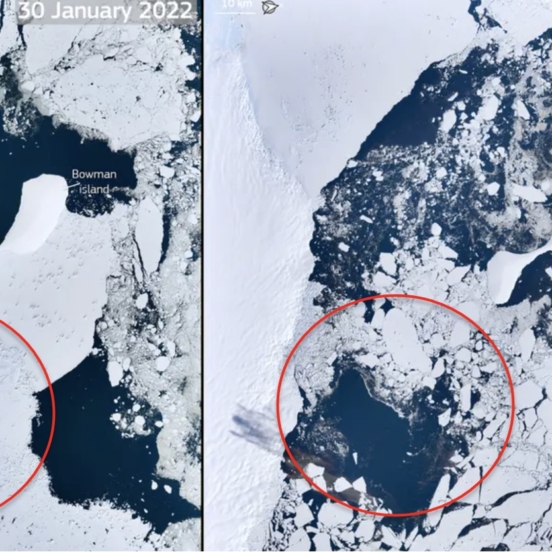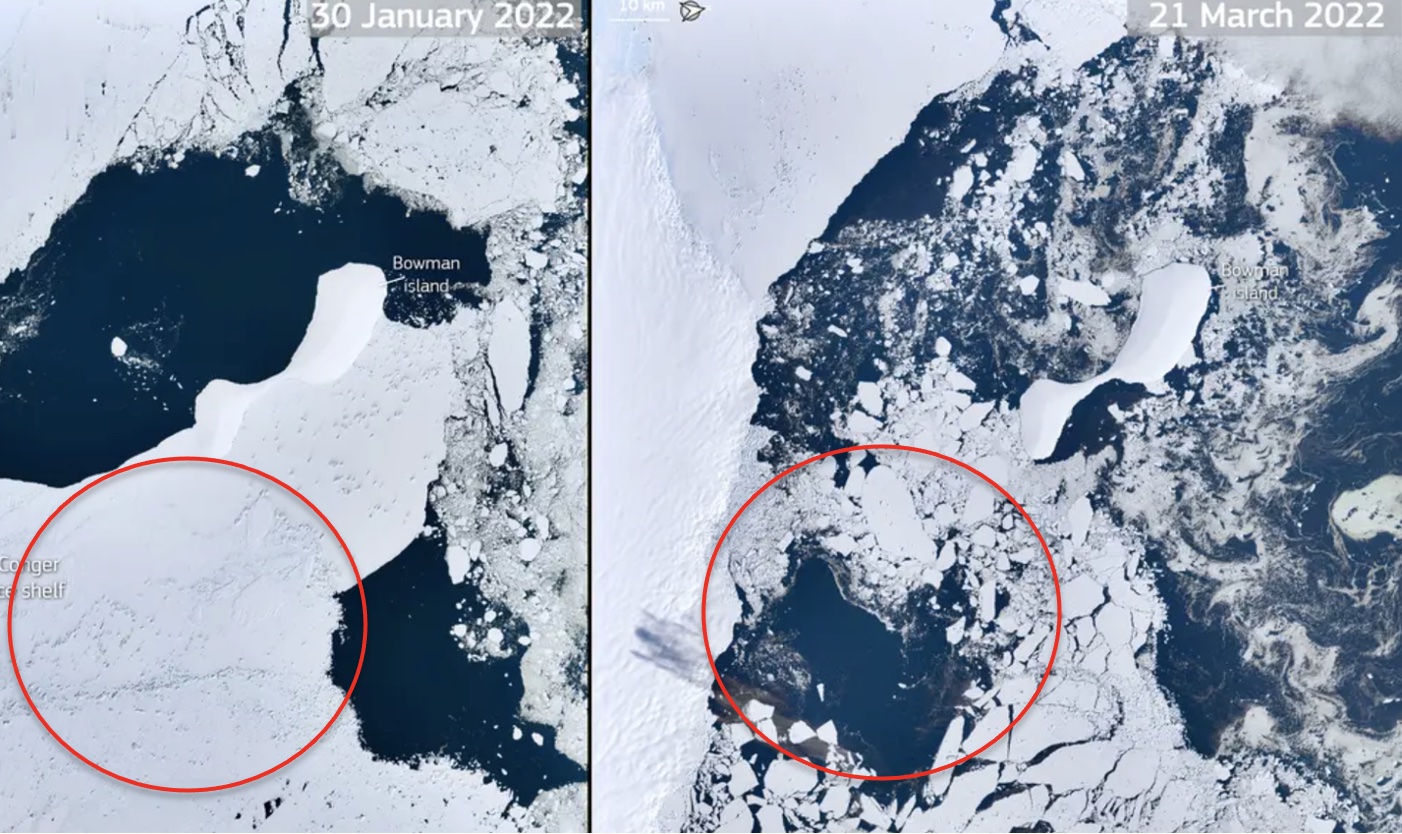Climate, Health and Equity Brief
Record heat, collapsing ice, and a 12-year warning
April 7, 2022

The Climate, Health & Equity Brief is GMMB’s take on the week’s news on the current impacts of climate change. If you haven’t subscribed yet, you can do so by clicking here.
Hot Topic: Breaking the ice. A new report has found that for humanity to have a 50 percent chance of limiting planetary warming to 1.5°C (2.7°F), wealthy countries must completely end oil and gas production within the next 12 years and provide financial support for developing countries—which have much smaller carbon footprints—to complete their energy transitions no later than 2050.
Driving home this urgency is the fact that the impacts of our continued reliance on fossil fuels are being felt much faster than expected. In Eastern Antarctica, two climate-fueled events have shocked scientists in recent days. On March 18, the Concordia Research Station—located at the coldest place on Earth—recorded a temperature of 70°F above normal, setting a new world record for the largest temperature excess ever recorded.
The same week, an ice shelf larger than New York City broke off in a region of the continent scientists have long thought was the least vulnerable to rising temperatures. Ice shelves play a vital role in restraining inland ice from flowing into the ocean and increasing sea level rise. While ice shelves naturally go through cycles punctuated by isolated calving events, scientists have seen several undergo total disintegration in recent decades, with this unexpected event continuing that troubling trend.
And other news this week continues to show the range of downstream effects that rising temperatures have on human and planetary health. Australia’s Great Barrier Reef is experiencing an unprecedented sixth mass coral bleaching event, marking the first such occurrence during a cooler ‘La Niña’ weather pattern. Some 726 wildfires burned across Texas in March, causing several communities to evacuate. And following a spike in West Nile Virus cases in Colorado, scientists warn that higher temperatures and increased drought conditions make conditions ripe for mosquitoes to thrive—and deadly diseases to spread.
—Matt & Traci, GMMB
Human Health
After at least 726 wildfires burned over 164,000 acres across Texas in the month of March, officials warn that persisting drought and above-average temperatures across the state are likely to fuel additional blazes in the days and weeks to come. (Reuters)
Scientists warn that intensifying drought conditions across the U.S. will increase the prevalence of mosquitoes infected with the West Nile Virus and potentially cause the number of annual nationwide cases to double—and triple in areas with low immunity—by mid-century. (Kaiser Health News)
New research revealed that particle pollution from wildfires in the Pacific Northwest and parts of Northern California could increase by more than 50 percent by mid-century and increase the risk of cardiovascular failure and birth defects, among other health issues. (San Francisco Chronicle)
Planetary Health
A new report found that to give the world a 50 percent chance of achieving Paris Agreement goals, the world’s richest nations must end fossil fuel production by 2034 and provide support for poorer nations to make the same transition by 2050. (The Washington Post)
An ice shelf larger than New York City has broken off eastern Antarctica, alarming scientists who long considered ice in the area stable and threatening to allow glacial ice streams to spill into the ocean and contribute to sea-level rise. (The Washington Post)
Temperatures at Antarctica’s Concordia Research station—typically the coldest place on Earth—surged 70°F above normal on March 18, shocking scientists and setting a new world record for the largest temperature excess ever recorded. (CNN)
Australia’s Great Barrier Reef is experiencing an unprecedented sixth mass coral bleaching event, marking the first time such an event has occurred in the midst of a cooler La Niña weather pattern year, which scientists had hoped would provide a recovery period for corals. (The Guardian)
Antarctica will come back to bite the rest of the world’s coastlines and it may happen faster than we think.”
– Prof. Matt King, Australian Centre for Excellence in Antarctic Science
Politics & Economy
President Biden’s new $5.8 trillion budget proposal for 2023 includes nearly $45 billion to tackle climate change, but the proposal has received criticism for a lack of funding dedicated to the transition away from fossil fuel use—the nation’s largest contributor to climate change. (The New York Times)
A U.S. Department of Commerce investigation into whether solar panels from Southeast Asia circumvent Chinese import limits could result in retroactive tariffs of up to 240 percent and imperil around 80 percent of planned solar projects across the country. (AP News)
Equity
With one-third of the world’s population—including about six in 10 people in Africa—currently lacking early warning systems for extreme weather, the UN has tasked the World Meteorological Organization with leading an effort to ensure that everyone on the planet is covered within five years. (The Guardian)
President Biden’s 2023 budget proposal includes requests for $11 billion for climate aid to support developing nations and more than $300 million for the EPA’s environmental justice program, but Congressional approval for the funding remains uncertain. (The Washington Post, E&E News)
The Biden administration announced a $3.2 billion plan to retrofit 450,000 homes in low-income communities with energy-efficient appliances and greater insulation to help lower household energy bills and slash emissions. (The Washington Post))
Life as We Know It
Increasingly warmer temperatures in the Great Lakes have caused the region’s “frost-free” season to increase by 16 days, forcing dog sledders to consider alternatives such as shifting to dry land in order to continue enjoying the popular sport. (The Washington Post)
Action
China has announced plans to produce up to 200,000 tons of green hydrogen annually and deploy 50,000 hydrogen-powered vehicles by 2025 in an effort to balance energy security and its climate goals and reduce emissions from transportation and industry. (Reuters)
A newly signed bill by Washington Gov. Jay Inslee (D) requires that all vehicles of the model year 2030 or later that are sold, purchased, or registered in the state must be eletric—the earliest all-electric new car target in the nation. (NBC News)
Hundreds of thousands of students marched in more than 750 cities worldwide last week to demand climate action and justice, marking the largest mass youth climate strike since 2019 and signaling a resurgence of the movement following the COVID-19 pandemic. (Grist)
Kicker
Check out the annual Grist 50 list of emerging leaders from diverse backgrounds across the U.S. working to create a sustainable future.
The GMMB Climate, Health & Equity Brief would not be possible without the contributions of the larger GMMB California team—Aaron Benavides, Elke Cortes, Sharde Olabanji, Adrian Plaisance and Stefana Simonetto. Feedback on the Brief is welcome and encouraged and should be sent to CHandEBrief@gmmb.com.






